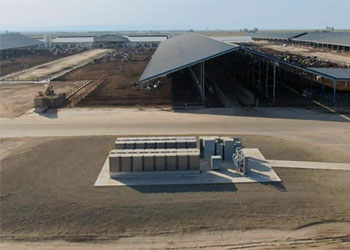The Bar20 dairy farm does not have access to a natural gas pipeline to dispose of their biogas emissions and the farm is plagued by high electricity costs and declining reliability from the electrical grid. To help the environment and to secure more reliable power, Bar20 partnered with CalBio to build a digester project to hold the farm’s manure and capture methane and partnered with Bloom to deploy fuel cells to produce electricity onsite from the methane.
Historically, it has been difficult to efficiently convert biogas into electricity without negatively impacting the environment. Onsite power generation has traditionally been performed using combustion-based gas turbines or gas engines, both of which suffer from low conversion efficiency and emit harmful criteria pollutants such as SOx, NOx and other particulate emissions. That’s where Bloom Energy comes in.
Bloom Energy’s solid oxide fuel cells (SOFCs) provide an electrochemical pathway to convert biogas directly to electricity without combustion. Bloom’s SOFCs exhibits the highest electrical efficiency among commercially available technologies and is therefore able to produce the most electricity per volume of biogas, roughly 30% to 50% more than combustion-based platforms.
The SOFCs are paired with a gas conditioning system, onsite, that cleans the biogas of moisture and contaminants, enabling its use for renewable electricity generation and dramatic methane reduction in the process.

